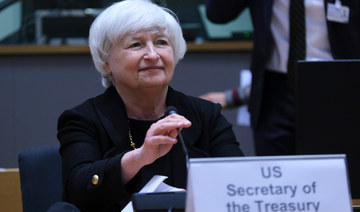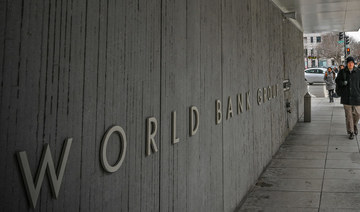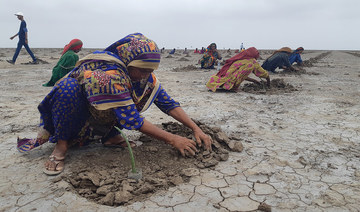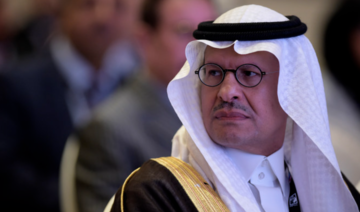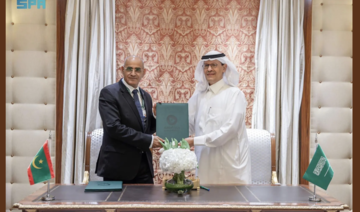WASHINGTON: The World Bank meetings were supposed to be a first step in a new era of affordable loans for developing nations hard hit by climate change like Prime Minister Mia Mottley’s Barbados, one of many Caribbean islands battered by worsening hurricanes.
But if this was a new era, the World Bank meetings that closed Sunday in Washington left Mottley feeling much like she did in the old one — sidelined by wealthy nations that balked at either providing more money themselves or significantly changing the lending rules for existing funds. And increasingly, beyond angry.
“I get really furious,” Mottley said, when hearing “that people are not ready, or people want to kick the ball down the road.”
She spoke at sessions held by the non-profit Rockefeller Foundation in conjunction with the World Bank meetings, where Mottley and some African leaders detailed the growing human and financial cost of natural disasters that are growing more relentless as the climate warms: a record-breaking tropical storm that sat over southern Africa for days last month, killing hundreds; tens of thousands of deaths from years of failed rains in the Horn of Africa; a formal declaration from Italy this month of a refugee emergency.
“How much more must happen?” Mottley asked. “How many more people must lose their lives?“
With a World Bank head appointed by former President Donald Trump on his way out, US Treasury Secretary Janet Yellen and others have been pledging a World Bank climate overhaul.
Momentum — and demands — have been growing for the World Bank and other powerful global and regional financial institutions to change their lending practices so that less-wealthy nations can afford to harden themselves against rising seas, worsening storms and other extremes of climate change. Developing nations also need help with the big investments it would take to move their economies away from climate-damaging coal and petroleum.
But so far, the governments with the biggest say, including the US, have been reluctant to put more of their own money into lending. As a group, they’ve also shied away from some of the changes in lending rules encouraged by Yellen and some others, fearing any move that could risk the World Bank’s AAA credit rating and make borrowing more expensive.
And looking ahead, advocates of freeing far more climate funding for countries primarily in the southern hemisphere worry no one is putting together the big tough plan that will turn lending-reform talk into action.
Some climate advocates expressed exasperation at one of the sole concrete steps approved by World Bank member countries at last week’s meetings: reducing the bank’s mandated ratio of equity to loans from 20 percent to 19 percent. That 1 percent percent tweak is expected to free about $4 billion a year for more lending.
The figure pales next to the $2.4 trillion that World Bank officials estimate developing nations need, in public and private funds, each year for the next seven to deal with climate change, pandemics and conflicts.
Developing nations complain — accurately — that the United States, Europe, China and other bigger economies have caused most of the climate damage and are leaving poorer nations to deal with the results.
The cost ranges from the Pacific island of Vanuatu struggling to move dozens of villages to higher ground to Pakistan dealing with sustained floods last year that covered a third of the country.
Global inflation and the strong US dollar have increased the debt burden on global and regional development loans in just the past year. Barbados’ interest rates on existing development loans soared, such as with an IMF loan whose rate went from 1.07 percent to 3.9 percent, Mottley said. She has spearheaded a World Bank lending-reform agenda, called the Bridgetown Initiative, by developing nations.
The US and other wealthy nations never made good on an old pledge to provide $100 billion a year in climate funding for developing nations by 2020.
US climate envoy John Kerry and other Biden administration officials make clear they see no point in asking a Republican-heavy Congress for that kind of money to give other countries for climate change.
Instead, the administration wanted to see how much money it could free up for developing countries with tweaks like the 1 percent cut in the equity-to-loan ratio, said Scott Morris, a former deputy assistant treasury secretary for development finance, now at the Center for Global Development research group.
Yellen last week called that move “responsibly stretching the balance sheet.” She promised discussions on “many more” procedural moves in the months to come.
There’s an argument, though, that Republicans in Congress would be more receptive to appropriating money for the World Bank, and that the Biden administration “ought to be willing to make the ask of Congress for this,” Morris said. The administration didn’t seem to anticipate “the degree of backlash” from developing countries against the modest steps so far, he said.
The World Bank and IMF spring meetings were the start of a series of upcoming global gatherings that advocates hope will build momentum toward significant action on emissions cuts and climate finance. They culminate with the annual UN climate talks in Dubai in November and December.
But climate is a “crisis that is obviously proving itself hard to adequately describe to people in a way that actually motivates them,” Kerry said at another side event to the World Bank and IMF meetings.
Evoking what international climate bodies say will be increasing flows of climate refugees worldwide, Kerry cited a 2015 refugee crisis in Europe, and the surge of nationalist and far-right political parties that followed.
“And the anger that my colleagues here, particularly Mia Mottley, have described is going to grow if we don’t respond,” Kerry said. “You’ve seen nothing compared to what is going to happen if we don’t respond more rapidly.”
Slow start on World Bank reform angers climate-hit countries
https://arab.news/gmky2
Slow start on World Bank reform angers climate-hit countries
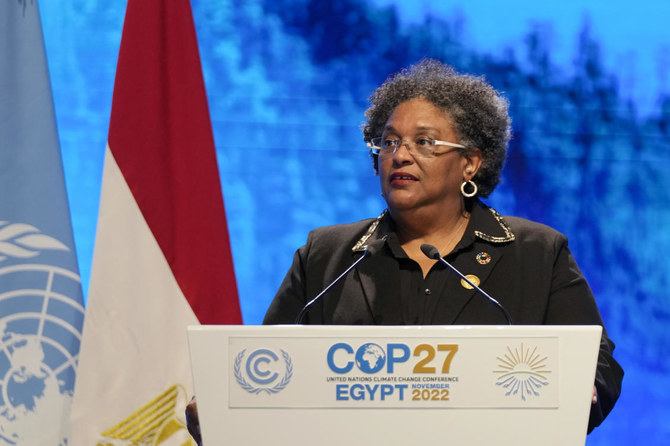
- Growing demands for powerful financial institutions to change their lending practices so that less-wealthy nations can afford to harden themselves against rising seas
Russia says shot down US-made missiles launched by Ukraine
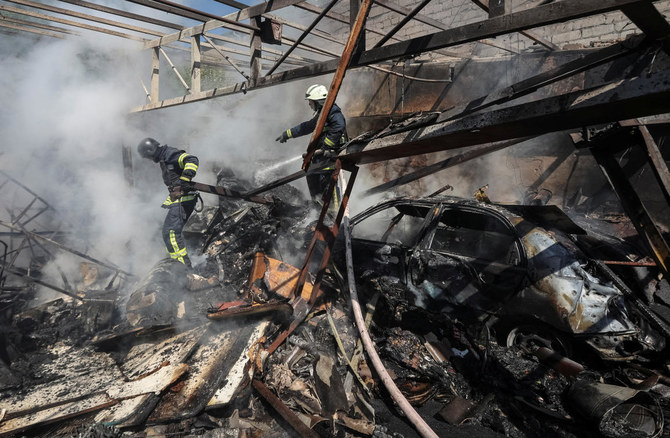
The Russian-installed head of Crimea, Sergei Aksyonov, said one of the missiles was downed in the village of Donskoye
MOSCOW: Russia said Tuesday it had shot down six US-supplied tactical missiles launched by Ukraine, with officials in annexed Crimea saying some were downed over the Black Sea peninsula.
Washington has said it had supplied the arms to Ukraine, which has been asking for more powerful weapons for months as it struggles to contain advancing Russian forces.
Moscow’s defense ministry said it had destroyed six Army Tactical Missile System (ATACMS) rockets “in the last 24 hours,” without saying where they were shot down.
The Russian-installed head of Crimea, Sergei Aksyonov, said one of the missiles was downed in the village of Donskoye, outside the main city of Simferopol.
“After an ATACMS missile was shot down, undetonated submunitions scattered,” Aksyonov said on Telegram.
“If you find such a weapon, do not pick it up or come close and call emergency services or the police,” he warned.
Aksyonov posted a photograph of a metal ball which he said was part of the destroyed missile.
Russia did not say if the missiles caused any damage in Crimea.
Earlier, an official from Russian-occupied southern Ukraine, Vladimir Rogov, said that air defense had been in operation over Simferopol and the town of Dzankoi, in northern Crimea.
Ukraine has regularly attacked Crimea during Moscow’s more than two-year offensive.
But it did not comment on Tuesday’s attack.
Last week, the United States said it had sent ATACMS missiles to Ukraine in February.
Ukrainian forces are now awaiting the arrival of new US weapons, green-lighted by President Joe Biden after months of being blocked by political wrangling in Congress.
Sri Lanka joins Global South-North dialogue through Riyadh WEF meeting
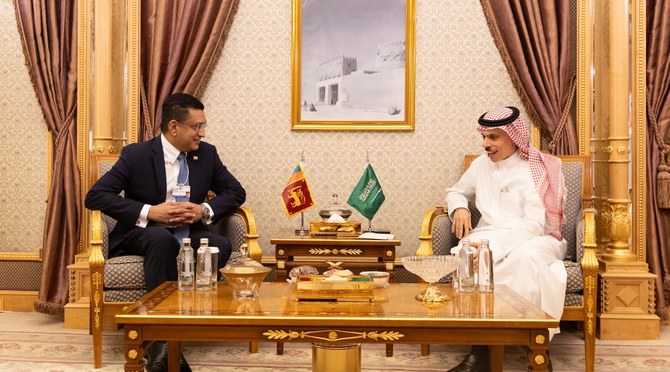
- Foreign Minister Ali Sabry was among the special meeting’s speakers
- He represented the Global South perspective at the invitation of Saudi FM
COLOMBO: Sri Lanka is trying to position itself in the dialogue between the Global South and North, its foreign minister said, following the World Economic Forum’s special meeting on global collaboration organized by Saudi Arabia.
The WEF’s Special Meeting on Global Collaboration, Growth and Energy for Development convened 1,000 global leaders arriving in Riyadh from 92 countries on April 28-29 to find actionable, collaborative and sustainable solutions to shared challenges.
The meeting saw a focus on the Global South, or countries, mostly in the Southern Hemisphere and largely in Africa, Asia and Latin America, which until recently have often been described as developing or less developed.
Sri Lanka FM Ali Sabry represented the Global South perspective at the forum’s session titled “North to South, East to West: Rebuilding Trust” alongside his Saudi counterpart, Prince Faisal bin Farhan.
“It was a great opportunity for me to showcase Sri Lanka and the challenges that countries in the Global South face, and also to position Sri Lanka as an important player, particularly in the Global South in shaping the future … for collaboration, peace and stability, rather than confrontation,” he told Arab News.
The minister was in Riyadh at the invitation of Prince Faisal, with whom he also held a meeting.
“We look forward to elevating the partnership,” Sabry said.
“We intend to sign the investment protection agreement that would probably pave the way for the inflow of investment into Sri Lanka.”
He also met other Saudi leaders during his visit to explore further cooperation possibilities.
The Kingdom has expanded ties with the South Asian island nation since last year, agreeing to broaden political consultation and launching a new employment scheme aimed at boosting Sri Lanka’s manpower exports.
Colombo has since sought Saudi assistance in developing several of its key sectors, including tourism and agriculture.
Saudi Hajj minister in Jakarta as Indonesia prepares record number of pilgrims
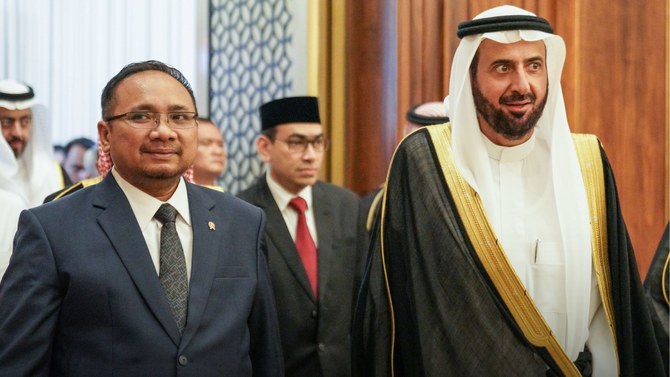
- 241,000 Indonesian pilgrims are set to perform the Hajj this year
- Saudi minister will launch tourism exhibit in Jakarta on Wednesday
JAKARTA: Saudi Arabia’s Hajj and Umrah Minister Tawfiq Al-Rabiah held meetings in Jakarta on Tuesday to coordinate pilgrimage preparations as Indonesia is going to send its largest-ever Hajj contingent this year.
The Kingdom has approved the 2024 quota of 241,000 Indonesian pilgrims, an increase of 20,000 from last year.
Al-Rabiah held discussions with Indonesia’s Religious Affairs Minister Yaqut Cholil Qoumas on ways to streamline Hajj services for the Asian nation’s pilgrims.
“I just had a long and productive meeting and discussion with my brother, the Indonesian religious affairs minister, which was focused on giving the best services and ease for Hajj and Umrah pilgrims from Indonesia,” Al-Rabiah said during a press conference.
“The Saudi government has revitalized historical and Islamic sites in Makkah and Madinah, and other sites related to pilgrimage and the journey of Prophet Muhammad … and we invite all pilgrims to come and visit these sites.”
Indonesia’s higher quota will help shorten the wait for some pilgrims by a few years, which is especially important for the elderly in the Southeast Asian nation. Many in the country wait up to 45 years for their turn, according to official estimates.
Qoumas said his interactions with Al-Rabiah had been meaningful.
“Maybe we can consider Indonesia as having received a special treatment from the Saudi government, as we are welcoming a big delegation led directly by the Saudi Hajj and Umrah minister, who are here to ensure that Indonesian Hajj pilgrims this year will get the best services from the Kingdom of Saudi Arabia,” Qoumas said.
“As a representative of the Indonesian government, we feel very grateful and thankful.”
Al-Rabiah is scheduled to inaugurate on Wednesday a Saudi Tourism Authority event showcasing the variety of travel destinations the Kingdom has to offer as it aims to attract more international visitors under Vision 2030.
Germany failing to protect Muslims from hate: Human Rights Watch
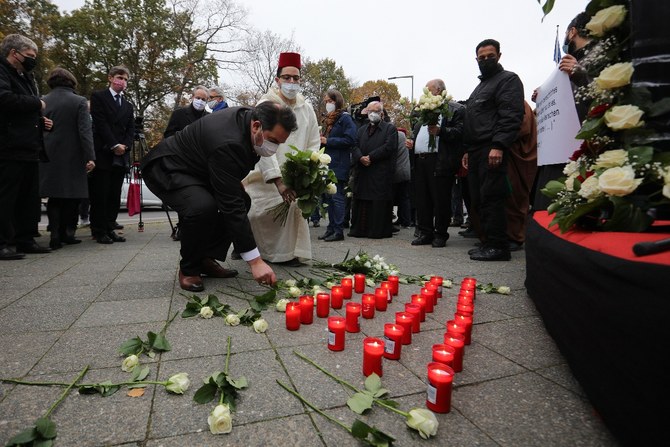
- Government ‘lacks understanding’ of racism targeting Muslim communities
- 2023 marked ‘frighteningly new high’ for hate incidents: German NGO chief
LONDON:Germany is failing to protect Muslims from growing racism amid a “lack of understanding” about the issue, Human Rights Watch has warned.
The country has yet to implement a working definition of anti-Muslim racism and frequently fails to record data on race-hate incidents, the organization said on Tuesday.
A key failing of the German government concerns its “lack of understanding that Muslims experience racism and not simply faith-based hostility,” said Almaz Teffera, a HRW researcher on racism in Europe.
“Without a clear understanding of anti-Muslim hate and discrimination in Germany, and strong data on incidents and community outreach, a response by the German authorities will be ineffective.”
Germany recorded 610 “anti-Islamic” crimes in 2022, but from the start of 2023 to September that year, the number had climbed to 686.
There are fears that the figure has further surged since the outbreak of the Gaza conflict last October.
Germany’s Interior Ministry told HRW that it could not provide data on anti-Muslim crimes from October 2023 to the year-end.
However, civil society groups in the country recorded a spike in reported incidents, leading Germany’s federal commissioner for anti-racism, Reem Alabali-Radovan, to join an EU-wide expression of concern about the rise in hate.
The Alliance Against Islamophobia and Anti-Muslim Hate, a German NGO network, documented “an average of three anti-Muslim incidents a day” last November.
The network’s chief, Rima Hanano, told HRW that “2023 marked a frighteningly new high for anti-Muslim incidents.”
Though the network collects its own internal data on the frequency of hate incidents, the German government “has yet to develop an infrastructure for countrywide monitoring and data collection,” HRW said.
The government has also classified hate incidents against Muslims as “anti-Islamic” since 2017, removing nuances surrounding the ethnic identities of victims, HRW added.
A three-year study commissioned by the government and published last year recommended that authorities “no longer dissociate anti-Muslim hate from racism,” but instead “recognize their connection.”
However, the Interior Ministry has failed to carry out the report’s recommendations, HRW said, adding: “Any focus on anti-Muslim hate and discrimination that fails to include racism or acknowledge the intersectional nature of such hostility will be unable to capture the full picture or inform effective policy responses.”
Muslim communities in Germany are a “group with a diversity of ethnicities” rather than a “monolithic religious group,” said Teffera.
“Germany should invest in protecting Muslims and all other minority communities in Germany because it is an investment in protecting all of German society.”
A gunman kills 6 worshippers inside a Shiite mosque in western Afghanistan, the Taliban say
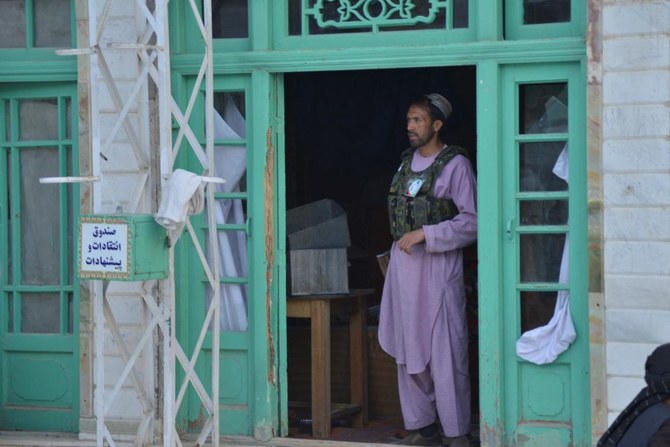
ISLAMABAD: A gunman stormed a mosque in western Afghanistan, opening fire and killing six people as they were praying, a Taliban official said Tuesday.
Local media reports and a former president of Afghanistan said the mosque was targeted because it was a place of worship for the country’s Shiite Muslim minority.
The attack happened on Monday night in the district of Guzara in Herat province, said Abdul Mateen Qani, a spokesman for the Taliban Interior Ministry. He said in a post on the social media platform X that an investigation was underway.
No one immediately claimed responsibility for the attack, which also wounded another worshipper while the attacker fled. Local media reported that the mosque's imam was among those killed.
“I strongly condemn the attack on the Imam Zaman Mosque,” former Afghan President Hamid Karzai said on X. “I consider this terrorist act against all religious and human standards.”
The United Nation Assistance Mission in Afghanistan also condemned the attack, which it said killed and wounded at least seven people, including a child. It called for urgent accountability for perpetrators and protection measures for Shitte communities.
The Islamic State group’s affiliate in Afghanistan is a major Taliban rival and frequently targets schools, hospitals, mosques and Shiite areas throughout the country.
The Taliban seized power in Afghanistan in August 2021, during the last weeks of the chaotic departure of U.S. and NATO troops from the country after 20 years of war.
Despite initial promises of a more moderate stance, the Taliban gradually reimposed a harsh interpretation of Islamic law, or Shariah, as they did during their previous rule of Afghanistan from 1996 to 2001.



